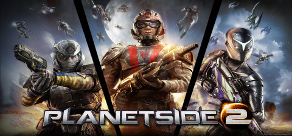Behind the Scenes: Making New Helmets
Greetings Auraxians!
For this month’s dev letter, we wanted to share something a little different – a behind the scenes look at the process our artists go through when creating new items in PlanetSide 2. Our example piece for this behind-the-scenes look is the new Lunar Dragon Helmet available in the Lunar New Year Bundle [2024]. We hope you enjoy a peek behind the curtain!
Planning
The process begins with a planning phase. During this time, ideas are presented to be made into an asset for an in-game event or update. Let's look at the Lunar New Year event as an example.
This year we decided to create a unique helmet for the event.
After consulting with our Game Designers about any specific requirements, the process is taken over by the Art Department.
Exploration
The Lunar New Year is a celebration that marks the arrival of spring and the beginning of a fresh lunar cycle. Honored by many cultures across Asia, the way it's celebrated is unique to each place. It is the most important holiday for the Chinese (Spring Festival) and is widely celebrated by Vietnamese (Tet Nguyen Dan), Koreans (Seollal), Mongolians (Tsagaan Sar), and many others.
The intricacies of traditions around the holiday are diverse, so we focused on the largest groups finding the most common element that overlaps. In this case, the Dragon zodiac symbol and the colors used during the festivities such as Gold (Yellow) and Silver (White). This is our foundation behind the helmet, decal, banner, frame, and nudge ideation. The work on the helmet starts with focusing on the keywords: Dragon, Fire, Asia, Red, Yellow, PlanetSide2, Sci-Fi.
We then visualize a concept of an idea.

From here the idea is born and we have a helmet influenced by Asian cultures in the PlanetSide 2 style. It incorporates a dragon head, red and yellow as the primary colors, and faction specific tints for additional details.
Next, we move on with exploring designs and shapes. At this stage, the shape becomes the primary focus.

Iteration
We then decide on three distinct ideas and present them for consideration.

After contemplating the scope of work, we choose a final direction.

Details
Next, we shift our focus towards functional and technical examination of the asset.
Taking everything into account, we start the linework, proportions of different elements, and we begin fine tuning the silhouette followed by adding in the details.
The idea is that the entire helmet is the dragon's head. The emptiness of the dragon's mouth will be represented by a dark visor hiding the player's face.

Grayscale
Linework is finished up and we move on to grayscale painting to block out the contrast.
The goal here is to have a clear separation of different elements without the dramatic difference in contrast between two close parts (we might just reserve that for a few focus points).

Color Exploration
At this stage we consider how the asset will exist within the environment, like hinting the faction colors, technical limitations, etc.
In this case, faction colors will be in the second plan, while the colors associated with the Lunar New Year will be brought to the first plan. The objective is to make the asset stand out without disrupting the sense of belonging.


Finalizing the Concept
We use the colors to further emphasize the face of the dragon, separate different elements, and provide space for hinting the player's faction.
For high production level work, we usually do not make highly detailed concept renders, a simple reference to work from is all that our 3D artist requires.

3D Modeling, Rigging & Implementation
Once the concept is done and approved, we move on to creating the 3D asset.
In this step, we make sure that the 3D artist understands the idea behind the concept. In this case, it just so happens that the 2D concept did not translate perfectly into 3D. This is why effective communication and direction is needed. It ensures a smooth transition into this step. This minimizes the need for 3D model corrections later on.



The base model is now textured and complete. We can move on to setting up the faction tints on the pre-agreed elements. In this case, the tints are deliberately subtle to not take away from the spirit of the helmet, which celebrates the Lunar Year.

The model is then sent to an animator for rigging and once rigged it is imported into the Engine. There, the shaders are set up and adjusted for the finishing touches bringing the helmet to life.
- PlanetSide 2 Team
